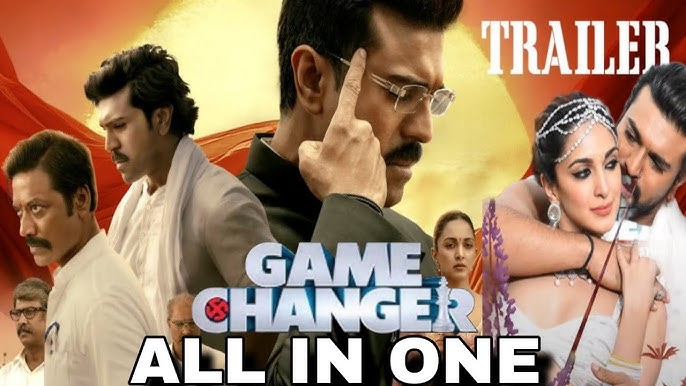Game Changer
Director Shankar’s debut Telugu film, Game Changer, featuring Ram Charan, Kiara Advani, Anjali, and SJ Suryah, stands as a monumental exploration of electoral politics. Known for his grand narratives since his 1993 breakthrough with Gentleman, Shankar sticks to his signature style, delivering a blend of nostalgia and predictability.
(Also Read: Game Changer Twitter reviews: Fans hail Ram Charan’s massy presence, call film Shankar’s ‘glorious comeback’)

Game Changer story
Ram Nandan (played by Ram Charan) is a fiery yet upright officer who transitions from an IPS to an IAS role, driven by an unshakable commitment to eradicate corruption in Vizag. His determination pits him against Mopidevi (SJ Suryah), a scheming politician hungry for power, setting the stage for an intense political drama.
On one side is Ram Nandan, a man of integrity battling his inner demons, particularly his anger. On the other is Mopidevi, a manipulative politician blinded by ambition. Their contrasting ideologies form the crux of the narrative, creating a classic good-versus-evil storyline.
Game Changer review
While Ram claims to be “unpredictable,” Game Changer doesn’t stray from the tried-and-true formula of commercial cinema. The outcome feels predetermined, as the hero’s victory is a given in such narratives. This predictability undercuts the tension, even as the film aims to surprise.
True to Shankar’s cinematic style, the film offers a visually grand and didactic approach. It educates the audience on the subject matter—this time, electoral politics—with moments of grandeur and ample creative liberties. Fans of Shankar’s work will recognize the familiar beats that make his storytelling both engaging and formulaic.
Game Changer succeeds in delivering entertainment, fulfilling the dual goals of engaging the audience and imparting knowledge. However, it struggles to make Ram Nandan a truly relatable or emotionally compelling protagonist. The lack of depth in his character arc limits the audience’s ability to connect and root for him wholeheartedly.
Midway through the film, the spotlight shifts unexpectedly to another character, who steals the show with their performance. This shift dilutes Ram’s impact as the central figure, leaving the audience more invested in the secondary character’s journey.
The film excels in its visual spectacle and pacing, ensuring the audience is entertained. However, its emotional resonance falters. While the larger narrative is compelling, Ram’s personal struggles and motivations fail to evoke enough empathy to make him a memorable hero.
Game Changer : Appanna and Parvathy
Shankar places the emotional weight of Game Changer on a brief yet impactful portion involving Ram as Appanna, an activist championing the cause of the downtrodden, and Anjali as his wife, Parvathy, a Tappeta Gullu artist. This segment is the heart of the film, providing a refreshing departure from the grandiosity that dominates the rest.
Ram and Anjali breathe life into their roles, infusing their characters with a delicate vulnerability. Despite their limited screen time, they manage to create an emotional connection, making their struggles resonate with the audience and elevating the narrative’s stakes.
This segment stands out against the broader, action-packed canvas of Game Changer. It offers a grounded and heartfelt perspective, showcasing the human side of the larger sociopolitical issues the film tackles. It’s a reminder of Shankar’s ability to weave intimate stories within larger-than-life narratives.
The story of Appanna and Parvathy stands out visually, breaking away from the polished, high-gloss aesthetic that dominates the rest of Game Changer. Tirru’s cinematography bathes these scenes in warmer hues, creating an intimate, grounded atmosphere that contrasts sharply with the rest of the film’s larger-than-life settings.
Game Changer : The Shankar formula
For those familiar with Shankar’s work, the narrative beats of Game Changer are predictable. Lavishly shot, vibrant musical numbers like “Dhop” and “Jaragandi” serve as visual spectacles but do little to advance the story or add depth.
The romantic subplot between Ram Charan’s character and Kiara Advani’s Deepika feels like a mere formality. While Kiara does her best with the material, Deepika is written as the archetypal heroine—a kind-hearted woman whose sole purpose is to steer the hero in the right direction. The love story lacks substance and fails to leave a lasting impact.
SJ Suryah’s Mopidevi is portrayed as a one-dimensional antagonist. His ruthlessness and lack of morals exist solely to contrast with the protagonist’s integrity, with no deeper exploration into his motivations or background. This oversimplification diminishes the stakes of the conflict.
While Shankar succeeds in creating visually stunning moments, the emotional core of the film is diluted. Characters like Deepika and Mopidevi could have been fleshed out more, adding layers of complexity to the narrative.
In conclusion
Karthik Subbaraj has penned Game Changer’s story; maybe he intended it to be something more…something different. But the version you get, while entertaining, feels rehashed from Shankar’s previous works – you even get Muqabla and Mudhalvan (Oke Okkadu) references. And unlike the 90s, in 2025, you know when he’s testing the limits of logic.
The issue also lies in the lack of magic, unlike his works from 1993 to 2007. Game Changer is strictly average, even as you’re rooting for it to be something more. It succeeds in staying focused on what it sets out to do – call out corruption in Indian politics – but gives you nothing more. And after Shankar’s last outing, Indian 2, maybe that’s a win.